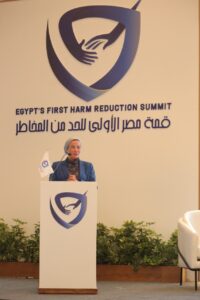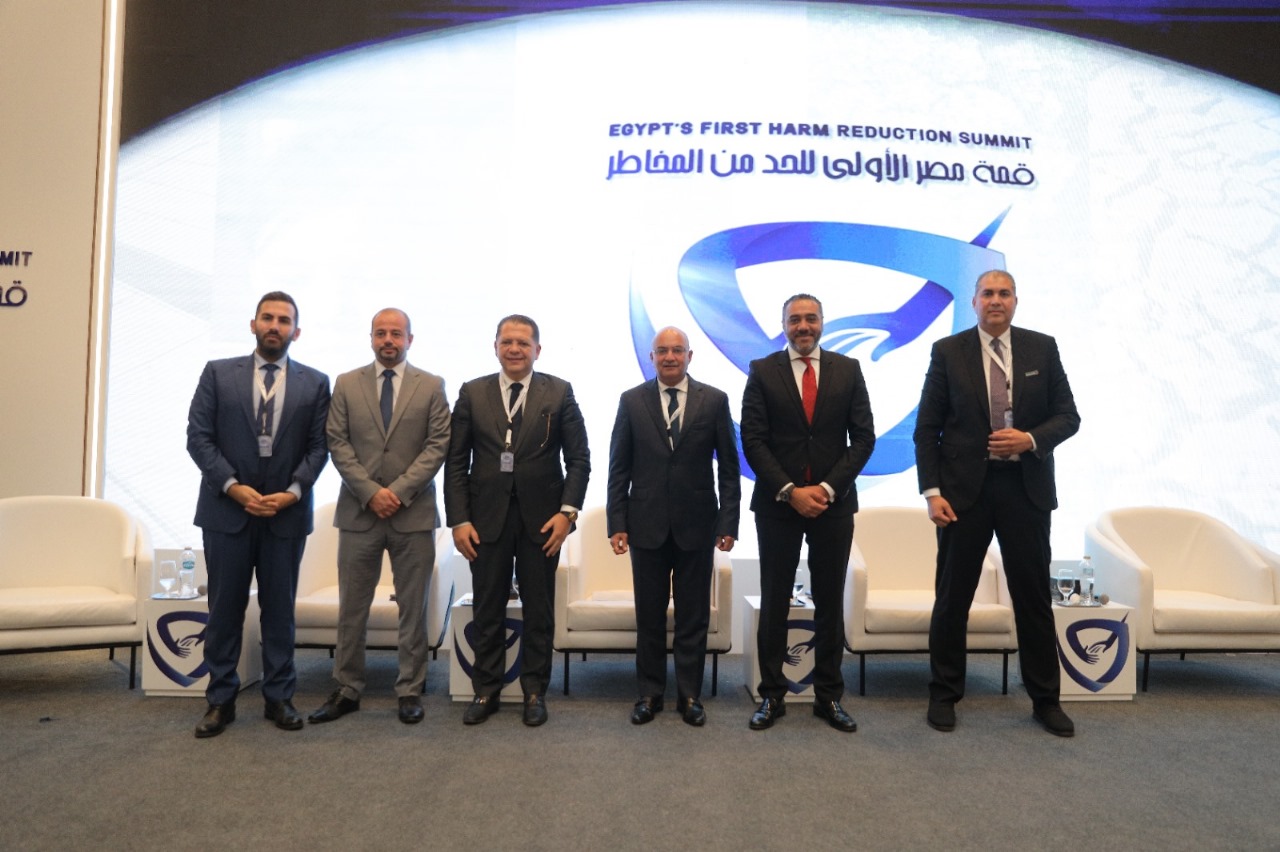A National Alliance For Harm Reduction, Boosting
Green Projects Financing to Sustain Exports, Integrating Harm Reduction in University Curriculums, and Expanding Smart Cities Are Among The Recommendations
Under the auspices of the Ministry of Environment and the Ministry of Planning and Economic Development, Egypt’s First Harm Reduction Summit successfully concluded in Cairo. The summit was attended by H.E. Dr. Yasmine Fouad, Minister of Environment, and Dr. Sherif El Gabaly, Chairman of Board of the Egyptian Chamber of Chemical Industries. The summit aimed at addressing the concept of harm reduction and mitigating the negative effects of harmful practices on the environment, health, and society and creating a platform to showcase successful case studies that have positively impacted both businesses and communities, aligning with national development goals in accordance with Egypt’s Vision 2030.
In her opening speech, H.E. Dr. Yasmine Fouad, Minister of Environment, showcased the ministry’s ongoing efforts to reduce harm resulting from climate change and deal with medical and electronic waste. Dr. Sherif El Gabaly, Chairman of the Board of the Egyptian Chamber of Chemical Industries (FEI), discussed the challenges faced by the chemical industries sector in sustaining exports amid a global direction to promote a green economy and urgency to adopt harm reduction policies to achieve Egypt Vision 2030. Eng. Heba Hammad, General Manager of Egyptian Standards (EOS), Convenor Egyptian Codex and ISO Convenor of DCCG/TC292, announced the formation of a specialized Artificial Intelligence (AI) committee to reduce harm resulting from unsafe information sharing.

The first session, titled “Harm Reduction Perspectives from Medical Experts,” featured a lineup of distinguished medical experts, who addressed the significance of applying the harm reduction concept in early disease detection and effective treatments, particularly in the case of diseases such as cancer and cardiovascular issues, strategies for preventing skin cancer and minimizing the dangers of excessive sun exposure, promoting healthy diets, increasing physical activity to lower the risk of heart and lung-related conditions, and smoking-related diseases. The panel saw the presence of Dr. Konstantinos Farsalinos, Senior Researcher at University of Patras, Greece; Dr. Hilmi Darwiche, Chest Physician and President of the Lebanese Pulmonary Society in North Lebanon; Dr. Adel Khattab, Professor of Pulmonary Medicine, Ain Shams University; Dr. Mohamed Zidan, Professor of Pulmonology, Alexandria University; Dr. Rania Mamdouh, Associate Professor of Psychiatry, Cairo University and Addiction Psychiatry fellow, UCLA; and Dr. Peter Harper, Oncologist and Founder Leaders in Oncology Care, London who joined via Zoom; and was moderated by Dr. Mahmoud El Batanony, Professor of Pulmonology, Ain Shams University.
The second session, “Harm reduction as a mutual beneficiation for businesses and communities”, explored how adopting harm reduction strategies can positively impact the private sector and businesses in terms of cost reduction, energy efficiency, and reducing their negative footprint on the environment. Simultaneously, the session shed light on how these practices contribute to communities in terms of quality of life, personal health, and well-being. Speakers at the panel discussion included Eng. Bassel Shoirah, Head of the Industrial Development Chamber at the Federation of Egyptian Industries and General Manager of Polaris Parks; Mr. Sherif Hamouda, Chairman, GV Investment Group Egypt; Mr. Ankush Arora, Group CEO, Mansour Automotive; Mr. Ayman Essam, External Affairs and Legal Director, Vodafone Egypt; and Eng. Ahmed Taleb, CEO of sales and marketing, Jazeera Paints. The panel was expertly moderated by economist and TV host Maurice Matta.
Throughout the summit, the speakers proposed a set of recommendations to accelerate harm reduction approaches and mitigate harmful practices that may have health, environmental, and social impacts on the community. These recommendations included:
1. Establishing a national alliance for companies and stakeholders in Egypt to establish the foundations and standards for reducing risks and combating them.
2. Incorporating the concept of harm reduction into university curricula to promote efficient use of natural resources, combat climate change risks and protect the environment.
3. Educating the public on harm reduction and integrating it into their daily lives and practices , emphasizing that immediate handling of anticipated risks leads to more effective and cost-efficient our responses.
4. Harm reduction is a fundamental aspect of medicine and healthcare practices. It is important to explore and emphasize the potential benefits of implementing harm reduction approaches in various medicinal fields such as psychiatry, oncology, pulmonology and cardiology to improve Egyptian public health.
5. Aligning risk reduction policies with international laws to ensure the sustainability of Egyptian exports.
6. Addressing the European Union to delay the implementation of import duties on carbon-emitting products, which is currently scheduled to take effect in 2026.
7. Increasing the number of medical and electronic waste recycling facilities to reduce the harm of cancer disease prevalence and incidence.
8. Enhancing financing for green and sustainable projects that aim to deploy technologies for improving energy efficiency across various industrial sectors.
9. Promoting collective efforts to foster a green economy to support the state’s plan to boost Egyptian exports to the European Union and other countries.
10. Cutting renewable energy prices to incentivize investors to shift towards it as an alternative and expand green industries.
11. Utilizing electric vehicles to lower pollution by 30-40%, resulting in a reduction of carbon emissions.
12. Increasing the number of green cities built using green and eco-friendly building materials.
Egypt’s First Harm Reduction Summit, sponsored by Vodafone Egypt, Jazeera Paints, Philip Morris Egypt, and Hyde Park Developments, has gathered an esteemed group of local and regional experts and specialists from both the government and the private sector to promote harm reduction strategies and principles in alignment with the United Nations Sustainable Development Goals (SDGs).












التعليقات مغلقة.